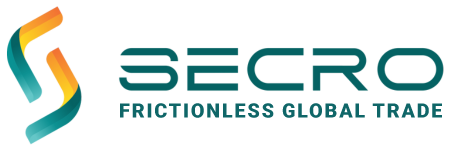Borrowers in commodity trade finance can significantly benefit from using Secro tokenized electronic bills of lading (eBL) over traditional paper-based bills of lading. Firstly, Secro tokenized eBL ensures faster processing times. The electronic transfer of title is instantaneous, reducing delays associated with couriering physical documents. This speed not only accelerates the availability of funds but also improves cash flow management for borrowers.
Secondly, Secro tokenized eBL enhances security and reduces the risk of fraud. The blockchain technology underpinning Secro eBLs provides a tamper-proof and transparent record of ownership and transfers, mitigating the risks of document forgery and loss. This increased security can lead to more favorable financing terms, as lenders perceive reduced risk.
Moreover, complete digitization of the bill of lading process simplifies logistics and administrative tasks. Borrowers can save on costs related to document handling and courier services. Additionally, real-time tracking and updates provided by the digital platform improve supply chain visibility and efficiency.
Finally, the use of Secro tokenized eBL can lead to better financing terms. With 100% of the transaction secured, lenders are likely to offer lower lending terms and conditions compared to scenarios where only 70% of the transaction is secured by traditional paper bills of lading.
Above all, since the lender is required to hold a substantially lower amount of capital reserves, the borrower is empowered to negotiate a more advantageous loan-to-equity ratio (LTV), increasing the number of yearly turnovers of its equity, which in turns improves the ROE.
This reduction in financing costs directly benefits the borrower’s bottom line.
Comparison Table: Economics of Transactions
| Aspect | Paper Bill of Lading (70% Secured) | Secro Tokenized eBL (100% Secured) |
| Transaction Duration | Longer due to courier delays | Instantaneous electronic transfer |
| Security Level | Lower, risk of fraud and loss | Higher, blockchain-secured |
| Financing Terms | Higher rates and less favorable conditions | Lower rates and more favorable conditions |
| Cash Flow Management | Slower, less predictable | Faster, more predictable |
| Supply Chain Visibility | Limited | Enhanced real-time tracking |
| Overall Financing Costs | Higher due to partial security | Lower due to full security |
Example Comparison Table: $10 Million Cargo Transaction
| Aspect | Paper Bill of Lading (70% Secured) | Secro Tokenized eBL (100% Secured) |
| Cargo Value | $10,000,000 | $10,000,000 |
| Secured Portion | $7,000,000 | $10,000,000 |
| Unsecured Portion | $3,000,000 | $0 |
| Credit Conversion Factor (CCF) | 50% (Unsecured portion) | 20% (Fully secured) |
| Risk-Weighted Exposure (RWE) | $7,000,000 * 20% + $3,000,000 * 50% | $10,000,000 * 20% |
| Total RWE | $1,400,000 (secured) + $1,500,000 (unsecured) = $2,900,000 | $2,000,000 |
| Capital Requirement (8%) | $2,900,000 * 8% = $232,000 | $2,000,000 * 8% = $160,000 |
| Capital Requirement Reduction | – | 31.03% |
Summary
Using Secro tokenized eBL can save the borrower significant costs by reducing the capital requirements for the lender, which can translate into more favorable lending terms. The enhanced security and efficiency of the digital process reduce the perceived risk for lenders, enabling them to offer better financing conditions. This results in lower overall financing costs, improved cash flow, and greater financial stability for borrowers.

